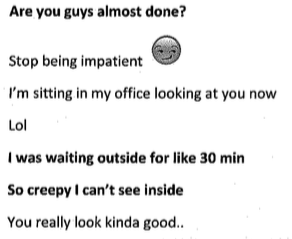Former football coach indicted on two counts of sexual battery
April 27, 2017
Tredell Dorsey, the former Georgia Southern football strength and conditioning coach, is awaiting trial on sexual battery charges. The trial involves the same employee who accused Dorsey of harassment.
Dorsey was placed on administrative leave with pay on July 7 following the submission of an incident report to the Equal Opportunity & Title IX office on July 6, according to the Title IX report.
The Title IX office began to investigate the incident report. Following the conclusion of the investigation, the university terminated Dorsey for inappropriate conduct, including violation of university policies regarding harassment on Aug. 15, 2016.
This occurred after months of “ongoing text messages containing inappropriate jokes and references from April 2016 through July 2016,” according to the Title IX report.
On July 1, 2016, Dorsey allegedly sexually assaulted the accuser, who at the time was a Georgia Southern employee, according to documents received from the Bulloch County Clerk’s Office court documents.
On Nov. 8, Dorsey was charged with two counts of sexual battery. Both counts of sexual battery were indicted and sent to the court, according the court documents.
In addition, an aggravated sexual battery count and rape count were no-billed after the grand jury failed to find enough evidence to charge Dorsey, per the court documents.
As of Monday, no court date has been set for the trial.
What happened?
The following is the account of what occurred on July 1. All information presented here is from the Title IX report.
On July 1, 2016, Dorsey and the woman agreed to go out for drinks after a long day at work. They decided to meet at a local food establishment and have a couple of drinks, as friends, according to the accuser’s account in the Title IX report.
According to Dorsey’s account, after a couple of drinks, she agreed to let Dorsey drive her home instead of calling an Uber. According to her account of the event, Dorsey attempted to kiss her in her car, an act which she refused.
Dorsey then asked if he could use her bathroom to which she agreed. As Dorsey was in the bathroom, she sat down on her bed, according to Dorsey’s account. She said that she began to have flashes in which she saw Dorsey taking her pants off, giving her oral sex and penetrating her, according to the accuser’s account.
Dorsey, in his statement, denied that he had kissed her, rather that she had kissed him, twice. In addition, Dorsey said that after he exited the bathroom at her apartment, they sat on the bed and began to kiss each other. Dorsey said that he pulled down her pants and performed oral sex on her, according to his account of events on the Title IX report.
Dorsey stated that he called her name as he was performing the sexual act at that time but received no response, which caused him to end everything, he then covered her up and left, according to the Title IX report.
He texted her later that night stating, “U passed out on me” and “Sorry I just left…Covered you up and left…”, according to transcripts of the text messages in the Title IX report. She responded with a text message saying, “I woke up to you having sex with me,” to which Dorsey responded with, “I stopped cause you where [sic] passed out,” according to the text messages in the report.
Relationship before the incident
Prior to the July 1 incident, Dorsey had texted her multiple comments that could be considered inappropriate that also violated the University’s harassment policy, according to the Title IX report.
Some text messages, included on the Title IX report, Dorsey sent to her included:
- What turns you on? What makes you go!!” April 27
- “Hey wanna make out this weekend? Lol” June 22
- “When can I get you drunk and you pass out on me lol” June 27
Around April 26, Dorsey began to make efforts to hangout with her outside of work by texting her, “I’m serious about hanging out before you leave,” according to the Title IX report.
On April 26, Dorsey whispered, “you look so f***ing good today” in her ear, she said. She said didn’t feel threatened or worried about him at the time. That same day it was the first time they hung out and had drinks, according to her account.
Following those events, Dorsey suggested hooking up and becoming, as he stated in one text, “Friends with benefits..” in response to her text, “Yeah because we’re just friends,” according to text messages in the Title IX report.
On May 11, they hung out outside of work again and Dorsey began to ask more sex-related questions in person, according to her account in the Title IX report.
Dorsey suggested that they stay in a hotel out of town on different occasions, to which she always declined because she didn’t feel comfortable doing that, especially since Dorsey had a family. Dorsey said in a text message that, “I promise no one would find out unless you ran [sic] your mouth,” according to a text message on the Title IX report.
On May 23, Dorsey began to call her “babe”, according to text messages. In addition, he began to ask her about previous relationships that she had. She said she started to become concerned and stated that her previous relationship she had was nice because “it was someone around her age, who didn’t have a family,” according to the Title IX report.
On July 1, she agreed to go out with Dorsey for drinks as friends, because she wanted to be have a working relationship with him.
Title IX procedures
The Equal Opportunity & Title IX office is in-charge of investigating sexual assault cases that involve Georgia Southern faculty, staff and students.
Joel Wright, the director of the Title IX office at Georgia Southern, stated that when a sexual assault complaint is filed against a faculty or staff member, the Title IX Office follows the University System of Georgia’s (USG) sexual misconduct policy. It is similar to the process students follow, with only one difference.
“When it comes to the adjudication phase, instead of going to a hearing panel, the report is sent to the appropriate vice-president. If it’s of a faculty member, then it would be to the provost,” Wright said.
The Title IX office investigates a variety of issues relating to domestic violence, dating violence, sexual assault and stalking. Cases involving two GS students or a GS faculty member and student are investigated regardless of whether they occur on or off-campus, Wright stated.
Whether or not the Title IX office conducts an investigation is a decision left up to the victim, however, the office provides resources and support. However, there are some circumstances under which the Title IX office will conduct an investigation.
“We consider factors such as campus safety. If we have established that there is a pattern of behavior, we might have to investigate regardless of whether the victim would like us to. If we feel like there is a safety issue for others on-campus, then we would investigate regardless as well,” Wright said.
According to the 2016 Clery Act report, there were four cases of sexual assault at Georgia Southern that were reported in 2015. National statistics show a different picture.
One in five women and one in 16 men are sexually assaulted while in college, according to the National Sexual Violence Resource Center. Wright feels that people are reporting more sexual assault cases because the process has become easier.
“We are seeing a trend to more reporting than less because our process is becoming more transparent. We are doing more education on how to report, where to report, what happens, so people are feeling more comfortable with reporting,” Wright said. “We see that as a good thing.”
Since the Title IX office simply investigates the cases for the university, they don’t have anything to do with the court proceedings if legal action is taking against the accused. At that point, the Title IX office will help, only if requested by the police or the court.
Keith Barber, Dorsey’s lawyer, said he could not comment because it is pending litigation.
Ian Leonard contributed to this report.
Illustration by JD McCarthy.










